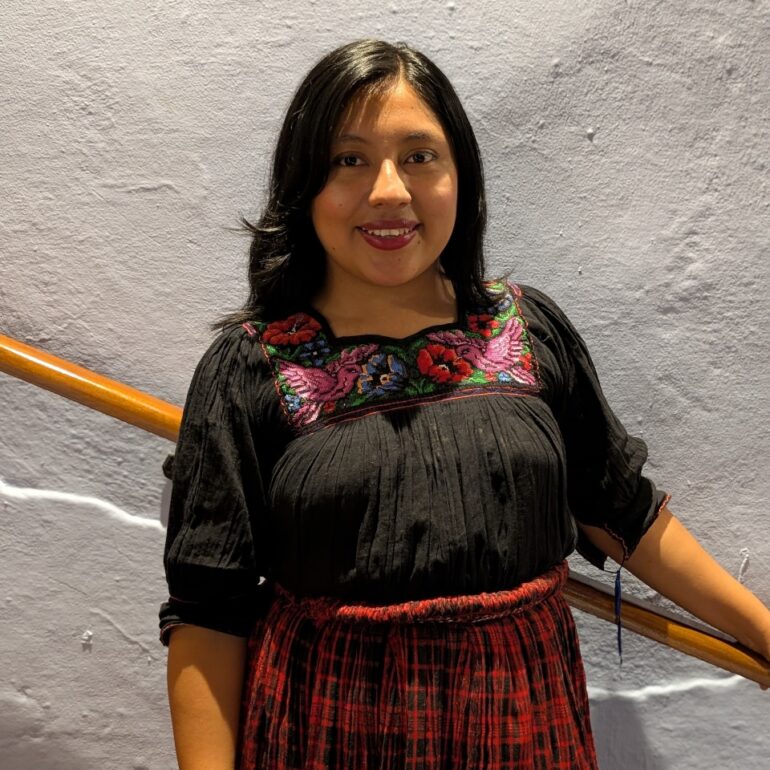Welcome to DU!
The truly grassroots left-of-center political community where regular people, not algorithms, drive the discussions and set the standards.
Join the community:
Create a free account
Support DU (and get rid of ads!):
Become a Star Member
Latest Breaking News
Editorials & Other Articles
General Discussion
The DU Lounge
All Forums
Issue Forums
Culture Forums
Alliance Forums
Region Forums
Support Forums
Help & Search
Latin America
Related: About this forumJournalist documents displaced indigenous communities in Guatemala amid violent land disputes
That night, as the wind lashed through fragile shelters, I thought of those children. I pictured the 16-year-old reading stories to her siblings, crafting a world where learning was possible. But reality hit hard: they faced a future repeating their parents’ history of dispossession, poverty, and invisibility. The most painful truth is the indifference that allowed an entire generation to grow up voiceless and without options.Mariela Laksman
18 hours ago
December 14, 2024

Alta and Baja Verapaz are regions in Guatemala, where indigenous and peasant communities face significant legal insecurity regarding land ownership, leading to a high concentration of violent evictions. | Photo courtesy of Neida Solís
BAJA VERAPAZ, Guatemala — As a community radio narrator in Guatemala, I dedicated myself to uncovering the harsh realities of the agrarian conflict. One photograph stands out vividly in my memory—a displaced family in a barren landscape. It drove me to act, ensuring their voices would not be silenced.
Each broadcast became a platform to amplify stories of human rights abuses and indigenous resistance. I highlighted evictions, the persecution of peasant leaders, and the voices of families torn from their land and left with nothing. Their struggles resonated deeply, shaping my mission to bring their stories to light.
Community radio: narrating stories of human rights and indigenous resistance
I grew up in a modest home, surrounded by stories echoing the mountains and fields. In the city, my grandparents recounted their youth in rural communities, describing the land they worked yet never owned. Their voices carried both longing and sorrow, captivating me and planting questions I could not articulate.
My mother, a schoolteacher, filled our afternoons with books about history and human rights. Her stories brought revolutions and acts of resistance to life, painting vivid pictures of people fighting injustice. Those moments, surrounded by worn books and her steady voice, stirred my curiosity about power, inequality, and the intrinsic value of every person. She taught me that stories could change perspectives, instilling in me a lifelong desire to understand why some lives seemed to matter more than others.
This foundation led me to community radio, where I narrated stories of human rights and indigenous resistance. Initially, I focused on preserving culture, protecting traditions, and advocating for rights like education and health. However, I quickly discovered a deeper truth: land lay at the heart of every issue. The lack of land, the fight to defend it, and the constant fear of eviction united these struggles, shaping the fabric of rural life.
While mainstream media vilified these communities as usurpers, I found dignity in their voices and resilience in their stories. Their strength left a lasting impression, deepening my commitment to an issue that defines not only rural life but also Guatemala’s social fabric. Listening to their struggles inspired me to act, turning my curiosity into a mission to amplify their voices and advocate for justice.
More:
https://orato.world/2024/12/14/journalist-documents-displaced-indigenous-communities-in-guatemala-amid-violent-land-disputes/
1 replies
 = new reply since forum marked as read
Highlight:
NoneDon't highlight anything
5 newestHighlight 5 most recent replies
= new reply since forum marked as read
Highlight:
NoneDon't highlight anything
5 newestHighlight 5 most recent replies
Journalist documents displaced indigenous communities in Guatemala amid violent land disputes (Original Post)
Judi Lynn
Dec 2024
OP
Judi Lynn
(164,049 posts)1. JOURNALIST'S NOTES INTERVIEW SUBJECT

Neida Solís is a Guatemalan journalist and sociologist dedicated to amplifying the struggles of the most vulnerable communities in her country. From her beginnings in community radio, Neida has focused on shedding light on human rights issues, particularly the experiences of indigenous peoples and peasants affected by Guatemala’s agrarian conflict.
In her reporting, Neida not only documents the violence the communities endure but also highlights their remarkable resilience. Through both her camera and her words, she captures the pain and hope that persist in those fighting for their dignity and ancestral rights. Neida’s commitment goes beyond journalism—she has become a steadfast ally to these communities, using her platform to amplify their voices in spaces where they would otherwise remain unheard.
BACKGROUND INFORMATION
The agrarian conflict in Guatemala is a deep-seated issue rooted in centuries of land monopolization by elites, which began with colonization. Indigenous peoples and peasants have long been marginalized, and during the internal armed conflict (1960-1996), this inequality worsened as communities were displaced and their lands seized by the military or agribusiness. Despite the 1996 Peace Accords promising to address the agrarian problem, progress has been slow, with institutions meant to mediate land redistribution dismantled. Violent evictions and the criminalization of community leaders have become commonplace, compounded by the lack of recognition of ancestral land titles and the rise of monocultures that harm both the environment and communities. Despite a system that favors the economic interests of a few, these communities continue to organize and demand justice. Government-promoted dialogue roundtables, though limited, are a small but necessary step toward resolving some issues. However, real change will require a genuine commitment from both the State and civil society to uphold land access as a fundamental human right.
https://orato.world/2024/12/14/journalist-documents-displaced-indigenous-communities-in-guatemala-amid-violent-land-disputes/